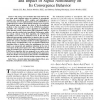Free Online Productivity Tools
i2Speak
i2Symbol
i2OCR
iTex2Img
iWeb2Print
iWeb2Shot
i2Type
iPdf2Split
iPdf2Merge
i2Bopomofo
i2Arabic
i2Style
i2Image
i2PDF
iLatex2Rtf
Sci2ools
123
click to vote
TSP
2010
2010
Analysis of the Stereophonic LMS/Newton Algorithm and Impact of Signal Nonlinearity on Its Convergence Behavior
The strong cross-correlation that exists between the two input audio channels makes the problem of stereophonic acoustic echo cancellation (AEC) complex and challenging to solve. Recently, two new implementations of the LMS/Newton algorithm that uses a linear decorrelation technique were proposed. This method helps to mitigate the effect of the ill-conditioned problem on the convergence rate of the LMS/Newton adaptive algorithm. The complexity of these algorithms is significantly lower than the recursive least-squares (RLS) algorithm, which is known to provide excellent echo cancellation. Furthermore, unlike the various versions of the RLS algorithm, the LMS/Newton algorithm is more robust to numerical errors. It has also been suggested that applying nonlinearities to signals at the two audio channels will help to alleviate the misalignment problem of stereophonic AEC systems. Simulation studies reveal that application of certain classes of nonlinearities to the two-channel LMS/Newton ...
| Added | 22 May 2011 |
| Updated | 22 May 2011 |
| Type | Journal |
| Year | 2010 |
| Where | TSP |
| Authors | Harsha I. K. Rao, Behrouz Farhang-Boroujeny |
Comments (0)

